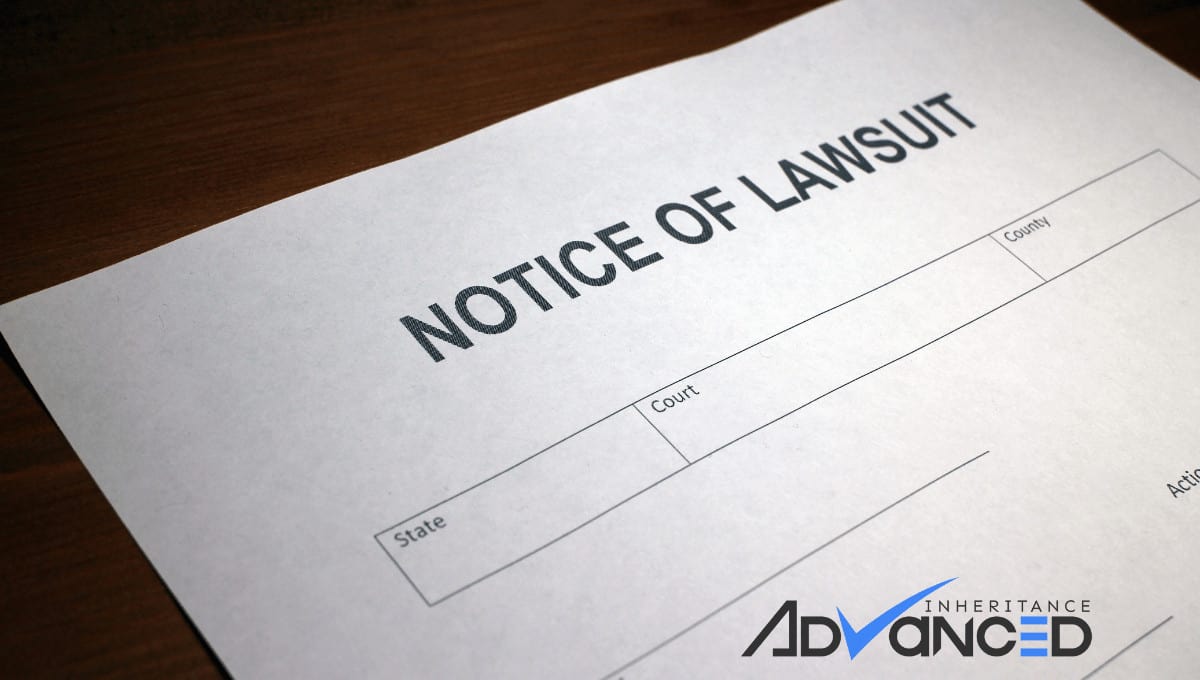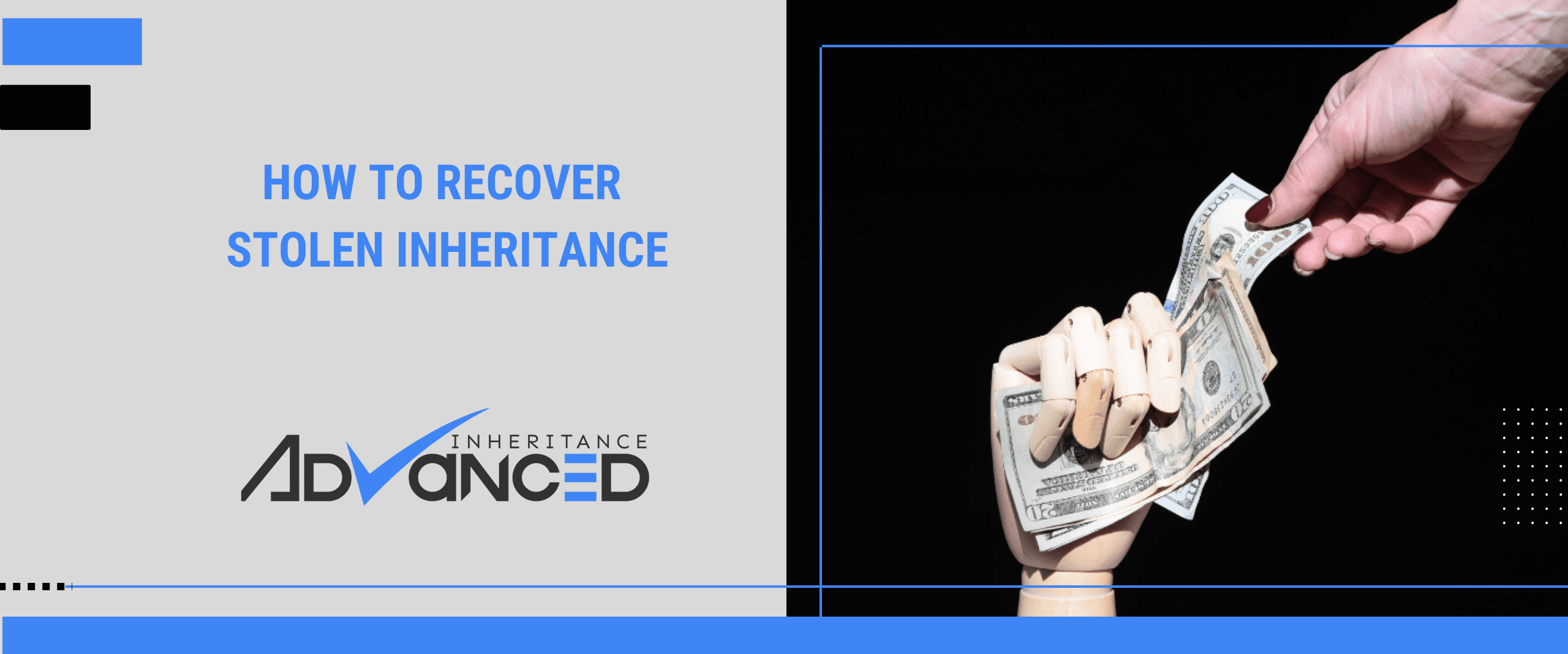Losing an inheritance can be a devastating experience, especially if it was stolen by someone you trusted. Whether it was taken through fraud, embezzlement, or some other means, the theft of an inheritance can leave you feeling betrayed and financially vulnerable. If you are in this situation, it is important to understand that you have options for recovering your stolen inheritance. In this blog post, we will discuss some of the steps you can take to try to recover your losses and hold the person responsible accountable for their actions.
Jump To Section
How Can You Recover Stolen Inheritance?
If you believe that your inheritance has been stolen, it is important to take immediate action to try to recover it. Here are some steps you can take:
-
Gather evidence: Collect any documents or other evidence that may be relevant to your case, such as wills, trusts, financial statements, and contracts.
-
Contact the police: If you believe that a crime has been committed, such as fraud or embezzlement, you should contact the police and report the theft.
-
Consult with an attorney: An experienced attorney can help you understand your legal options and represent you in any legal proceedings that may be necessary to recover your inheritance.
-
Consider civil action: If the person who stole your inheritance is not facing criminal charges, you may be able to take civil action to recover your losses. This could involve filing a lawsuit against the person or seeking compensation through a mediation or arbitration process.
It is important to act quickly in these cases, as there may be time limits on when you can take legal action to recover your stolen inheritance.
We hear the stories and take it will never happen to us. The reality is, some people steal inheritances that belong to others. It is important to understand your rights as a beneficiary. Unfortunately, many people don’t learn of their rights until after they have had a loss. If you want to know how to recover stolen inheritance, keep reading!
Did You Know That You Can Get An Advance On Your Inheritance?
Document Everything
The most important thing you can do to recover your stolen inheritance is to document everything. If you know the person who has your inheritance, record all of your conversations. Be sure to use email as much as possible. If there is any way to record a phone conversation, do so. It is important to know the laws around recording conversations, you may need to get their permission to record.
You also don’t have to document, conversations be sure to document everything. This includes dates and times of any activity that may have been a part of the theft. Such as unusual transactions at the bank or unusual behavior. It can be something as simple as a timeline of events that have led up to the theft. The more information you have documented the better your chances of recovering your inheritance.
Just Ask!
It may sound a little too simple but if you ask, sometimes you will get your property back. If you’ve been documenting all of your conversations and have every bit of evidence to prove that the assets are yours, the person may give it back instead of dealing with the court system. Don’t be shy about the evidence you do have, use it to your advantage when you’re asking for your property back.

Get Legal Advice From A Probate Attorney
So maybe you asked for your property back and the thief decided not to do the right thing. This is where a probate attorney becomes your biggest asset. When you meet with the probate attorney there are four questions that you will discuss. Those are regarding what the inheritance was, who took it, when did the table take place, and how did they steal it? Let’s dive into each one of these questions a little bit further.
What Is The Inheritance?
Many people assume that inheritance is cold-hard cash. However, a lot of times inheritance is a physical property. Such as a home, land, or a vehicle. Sentimental items such as household knick-knacks or paintings passed down through the family are also considered inheritance. If you have a copy of a will that lists everything that you were owed, provide it to the probate lawyer. They will need a complete list of everything you are owed to proceed with filing a lawsuit against the person.
Who Stole It?
Knowing who stole the inheritance is a vital part of the lawsuit. If you do not know who is the person that took it, a list of suspects is important. The list must include evidence as to why you think they are the ones who stole your inheritance.
If you do know who stole the inheritance, this should be noted to the probate lawyer immediately. They will ask questions regarding their relationship with the deceased. Perhaps they were a caregiver, executor of the estate, or a family member. It could even be a financial professional who had control of the estate before death.
When Did The Theft Take Place?
When the theft took place will rely heavily on the timeline you can provide. More often than not, a thief has been working at the scam for quite some time. The more you know about how a person has stolen your inheritance the better it is for your case. Did this person befriend the deceased? Or perhaps they were able to get the deceased to change the will so they became the executor of the estate. Or worse, wrote others out of a will to gain more. If the theft was done by a family member it could have been manipulation or threats of harm. Documentation that can support your timeline will also help prove if the theft was premeditated or a quick act of desperation. When you seek out a lawyer for legal advice this is one of the key questions they will ask almost right away to determine if you have a case.
How Did They Steal It?
Figuring out how the thief stole your inheritance will depend on your documentation and your timeline. While we often assume that the thief has manipulated the deceased, that isn’t always the case. Sometimes it’s as simple as getting access to assets before inventory has been taken. If that is the case you will note some oddities in their behavior before inventory is taken. They make excuses about missing assets. They stall on providing information to all of the beneficiaries. Or they simply ghost the family and friends of the deceased rather than provide any information. If they are selling off assets quickly before inventory is taken, you may notice that they are depositing more money into their accounts.

File A Lawsuit
Now that you have reviewed your evidence and your timeline, you may think you have a solid case and are ready to hit the courts. The reality is, sometimes it isn’t always the best course of action. Before you file those documents let’s go over what your lawyer will have to say about recovering your stolen inheritance.
Is It Worth Pursuing?
The first thing your lawyer wants to discuss with you it’s whether or not the case is worth pursuing. This is a volatile time for any person that has had property stolen. Especially if that property and assets belonged to a loved one who left them to you. Everyone wants to see justice take place and feels that going to court is the best course of action. Unfortunately, sometimes it’s not worth the time and money. Let’s consider the three things that will affect whether or not you should go to court.
- Cost to sue
- Value of the inheritance
- Effectiveness of your evidence
Cost Of Lawsuit
As with any lawsuit, there is a cost. You’re looking at lawyer’s fees, filing fees at the courthouse, and your time away from work to pursue your stolen inheritance. Is it worth the expense to sue the person that you believe stole your inheritance? For some people, it is worth the cost. Usually, people have more disposable income. But if you are the average Joe, spending time in court battling for stolen assets can become a financial burden.
Value Of Inheritance
In many states, there is a requirement that the value of your inheritance must meet. For instance, in civil court, you may need to have an inheritance worth up to $3,000. In some states, the requirement might be for a value of a minimum of $3,000. If your lawsuit does not meet these requirements, your probate attorney will stop any proceedings.
Value Of Evidence
When we discuss the value of your evidence, we are not talking about monetary value. The value of your evidence is really whether or not it is solid. If it’s circumstantial, you are less likely to win your case. But if you have solid documentation and an air-tight timeline, it will be worth your time and money.
Recovering From The Theft
The recovery of your assets can be a time-consuming endeavor. When you get your legal advice, be sure to ask how much time your lawyer thinks everything will take. Then check in routinely on that timeline. The longer you are in court, the longer everything will take. Then you must wait for restitution to be paid or property to be returned. This can take even longer and there is no guarantee you will recover stolen assets.
Once you have succeeded in your case, Inheritance Advanced can help. We can provide you with the cash you are owed while collecting the restitution and estate assets. We can make things a lot easier for you and your family members. Call us today to learn more!
Be A Part Of Estate Planning
The best way to prevent stolen inheritance is to understand how estate planning works and your rights. Retain legal counsel to help you navigate every step and through probate court. You want to know the status of the financial affairs and how certain assets will be distributed. If you want to be the executor of the estate, you need to know what the legal ramifications are for mishandling the decedent’s estate. When you know how things work and your rights, you are less likely to have your inheritance stolen.
What Is Considered An Inheritance Theft?
Many situations can count as inheritance theft even though some have more impact and are more evident than others. Inheritance theft or hijacking can come in the following forms:
-
When your attorney, trustee, or executor abuses their office to extort you or make unpleasant decisions on your behalf.
-
When your executor, trustee, or attorney uses undue influence or coercion to make you make unpleasant decisions.
-
When your executor attempts or succeeds in stealing assets from the estate inventory.
-
When your attorney destroys will and trust documents for any reason, it is deemed they did it for ulterior motives.
-
When your trustee attempts or succeeds in diverting trust assets for personal use.
-
When your executor or trustee bills you exorbitantly for their services.
-
When your executor, trustee, or attorney engages in fraudulent activity related to the will or trust documents.
Inheritance theft can also happen within your family when a fellow beneficiary withdraws any amount from the bank account without your knowledge or approval.
Can You Avoid Having Your Inheritance Stolen?
You can avoid certain forms of inheritance theft, especially the ones involving your trustee, attorney, and executor. You have to work with a highly recommended attorney with integrity and experience. However, there are other forms of inheritance theft or hijacking that you may be unable to avoid, especially the ones involving family members and their access to joint accounts.
Is It Possible To Recover Stolen Inheritance?
It is possible to recover stolen inheritance if you work with an experienced inheritance attorney. However, you must determine if the stolen estate is worth the time, money, and mental strength required to follow the case through. Below are a few considerations to consider before chasing an inheritance theft case:
The cost of the lawsuit and attorney fees
Before you start an inheritance theft lawsuit, you should consider the entire cost of putting the case in court, including lawyer’s fees, court charges, and the cost of time spent in court and off work.
The possibility of recovering the inheritance
You may have the best attorney in the state and still not be guaranteed a win. Your attorney will only fill you in on your chances of winning and getting your inheritance back but cannot assure you that the court will rule in your favor. You also have to consider that the court may not be able to force the return of the inheritance even after you win the lawsuit.
Proving Your Case
Proving your case is one of the most challenging things to do in an inheritance court and also one of the most important. You have to convince the court that the theft happened and bring solid evidence to prove it. This can be difficult if you don’t know when the theft occurred or who did it.
You may also find it difficult to prove that a physical asset is in a suspect’s possession in court. Also, if the decedent was manipulated or coerced into giving out a real estate property, you must be able to prove it in court with a title or deed. All these factors make it challenging to prove your case in court. However, with a competent attorney, you can win the case and get your inheritance back.
FAQs
What do I do if I am cheated out of inheritance?
Your first action should be to contact a competent inheritance attorney to know your rights and restrictions as well as your chances of winning the case and getting the inheritance back. Your attorney will also let you know if the theft is worth pursuing.
Can executors cheat beneficiaries?
Executors can cheat beneficiaries of their inheritance even though they are legally obligated to apply integrity, care, and skill while carrying out their duties. If you believe your executor is cheating you out of your inheritance, you can ask to read all the documents and request receipts for everything that is bought or spent.
How do I fight for my inheritance?
If you are convinced you have been cheated out of your inheritance, you can follow these five steps to fight for it.
-
Read all the will and trust documents carefully
-
Know the inheritance laws in your state
-
Consider settling out of court
-
Look for concrete evidence
-
If you’re still convinced you want to pursue the case, speak with an inheritance attorney.









